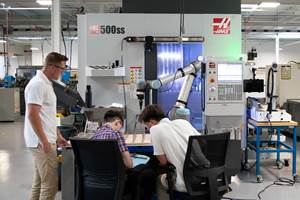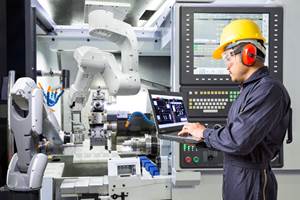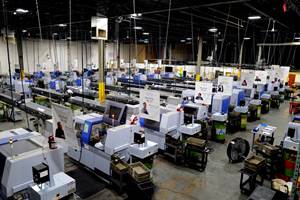Arizona Manufacturer Finds Night And Weekends No Problem For Automated EDM
A Mitsubishi VX10 working in conjunction with a System 3R Workman Robot routinely operates unattended from Friday afternoon until Monday morning for this Arizona manufacturer.
Share





Takumi USA
Featured Content
View More
Hwacheon Machinery America, Inc.
Featured Content
View More



"We measure actual burntime," Bill Kushmaul likes to point out. "In an average mold shop, EDM equipment is actually burning a workpiece only 20 percent to 30 percent of the 168 hours in a week. Using state-of-the-art equipment and automation, we can improve that dramatically."
Mr. Kushmaul, president of Tech Mold, Tempe, Arizona, has looked long and hard for ways to automate elements of the mold building processes. One challenge: EDM machinists were spending a great deal of time setting up a machine for a new part and changing electrodes. Another problem was that skilled personnel were reluctant to work nights and weekends, so EDMs were used only during the daytime hours, with some extended burning into the early evening hours. Some months ago, Tech Mold acquired its first Mitsubishi VX10 ram EDM (MC Machinery, Mitsubishi EDM, Wood Dale, Illinois).
"Utilizing night and weekend operation as much as possible is more important than anything else we can do," Mr. Kushmaul notes. Today, the VX10, working in conjunction with a System 3R Workman Robot, routinely operates unattended from Friday afternoon until Monday morning. The 3R Robot, a six-foot tall carousel, is capable of changing as many as 72 workpieces and 72 electrodes—completely unattended. Both the workpieces and electrodes are palletized. When one workpiece is finished the robotic arm removes it, then removes the used electrode. It then selects the next workpiece and the next electrode from the carousel and loads them. Both the workpieces and electrodes are automatically mounted in chucks within a tolerance of 0.00008-inch.
One of the keys to Tech Mold's automation is the VX10's input system, which Mitsubishi calls ESPER (Easy and Simple Programming by Expert System). Programming with ESPER involves inputting answers prompted by the machine. Input data includes, for example, the number of rough and finish electrodes, the electrode size, burn locations, and depths.
From this information, the ESPER system constructs the most efficient sequence of generator settings for a given work-piece. A truly talented machinist might be able to work out the same sequence—but the system assembles the program without human assistance. One result is that the number of electrode changes that is needed is reduced to a minimum. On a Friday afternoon, when Tech Mold personnel prepare the VX10 for a full-weekend run, only a few keystrokes are needed to set it in motion. ESPER fully supports the System 3R robot as well. And a full weekend run of the automated system adds about 60 hours to the machine's week—more than double the hours it runs during a normal Monday-to-Friday week.
To carry out all of the instructions required for such long, completely unattended operation, the VX10 goes a step beyond ordinary computer numerical control; it uses fuzzy logic. The advantage of fuzzy logic is that it takes into consideration all of the machining conditions and makes adjustments accordingly. Machines using fuzzy logic constantly monitor all of the operating conditions for actual—and not assumed or theoretical—efficiency. The fuzzy logic then makes instantaneous adjustments seeking the best setting for efficient cutting conditions. A high-performance sensor detects tiny variations in burn conditions—variations said to be so tiny that no human operator could perceive them. This feedback is sent to a 32-bit microprocessor. The VX10's fuzzy logic receives this data and makes instantaneous adjustments.
Mr. Kushmaul has instructed his EDM personnel to investigate modifying the system's fuzzy logic. "We want to see whether we can improve performance even more by manipulating the controls. We have previously been successful in fine-tuning the software to match our type of job and cutting conditions."
"What I like about the VX10's fuzzy logic system is that it is always aggressive," Mr. Kushmaul explains. "Other systems may start off burning aggressively, but when there is a change in conditions, they become conservative and slow down. This system keeps right on adapting, and it becomes aggressive again instantly."
Mr. Kushmaul has also tested Mitsubishi's claim that its fuzzy logic system measures up to the machining knowledge of a very skilled operator. "We've known for a long time what we could be more competitive if we could use EDM machines at night," he observes. "But it's hard enough to find skilled operators for the daytime shift, and finding one who is willing to work nights is even harder. The fuzzy logic system has helped us solve this problem."
The VX10's fuzzy logic works along with the system's newly developed fine pulse power supply. Mitsubishi developed the fine pulse technology to solve the problem of secondary discharge in EDM machines. Secondary discharges create machining waste, which in turn makes electrodes wear faster than they should and can lead to a poor surface finish. The fine pulse power supply, for which a patent is pending, nearly eliminates secondary discharge. If secondary discharge does occur, its effects are greatly reduced. Mr. Kushmaul notes that the ability to minimize secondary discharge is especially important for long unattended runs. And he is satisfied with the surface finish of the parts with the automated system. The combination of very reliable software and very reliable hardware permits such good results even with unattended weekend-long runs.
Recently Tech Mold has used the Mitsubishi XV10 to EDM two projects which had previously been burned on their original machines. Mr. Kushmaul found that the VX10, in addition to automating this job, cut the manufacturing time dramatically from what it would have been. One of the results of the quick response of fuzzy logic, and of automated ESPER programming, is that the time needed to burn a given part is reduced. "The promise of the computer numerically controlled EDMs was that we would acquire the skill of an expert human operator," he notes. "We certainly have that with the VX10. Four things are critical in EDMing: freedom from contamination, electrode wear, burn time, and - above all else—the finish quality. The VX10 has performed all four aspects of this process superlatively.
"The ability to automate EDMs for truly long periods of unattended operation was what we really needed," he adds. "Mold shops may have the perception that mold making is an old style, custom-work type of business. The truth is that mold makers need to automate as much as possible in order to remain competitive and meet the customer's needs. The VX10 has helped us to do exactly that."
Related Content
CNC Machine Shop Honored for Automation, Machine Monitoring
From cobots to machine monitoring, this Top Shop honoree shows that machining technology is about more than the machine tool.
Read More6 Machine Shop Essentials to Stay Competitive
If you want to streamline production and be competitive in the industry, you will need far more than a standard three-axis CNC mill or two-axis CNC lathe and a few measuring tools.
Read MoreInside the Premium Machine Shop Making Fasteners
AMPG can’t help but take risks — its management doesn’t know how to run machines. But these risks have enabled it to become a runaway success in its market.
Read MoreThe Future of High Feed Milling in Modern Manufacturing
Achieve higher metal removal rates and enhanced predictability with ISCAR’s advanced high-feed milling tools — optimized for today’s competitive global market.
Read MoreRead Next
5 Rules of Thumb for Buying CNC Machine Tools
Use these tips to carefully plan your machine tool purchases and to avoid regretting your decision later.
Read MoreRegistration Now Open for the Precision Machining Technology Show (PMTS) 2025
The precision machining industry’s premier event returns to Cleveland, OH, April 1-3.
Read MoreBuilding Out a Foundation for Student Machinists
Autodesk and Haas have teamed up to produce an introductory course for students that covers the basics of CAD, CAM and CNC while providing them with a portfolio part.
Read More


































.jpg;maxWidth=300;quality=90)















